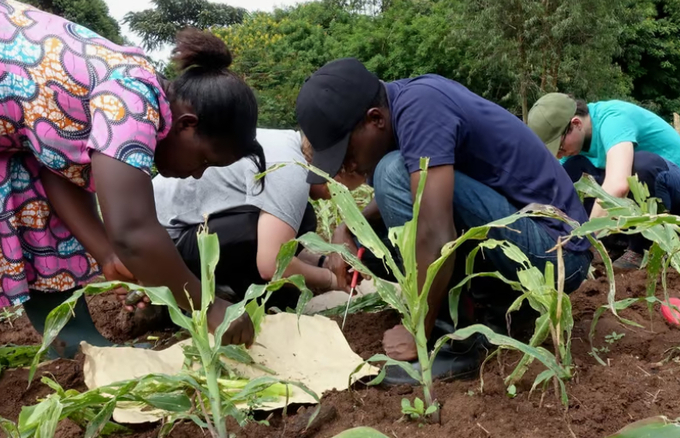June 17, 2025 | 09:21 GMT +7
June 17, 2025 | 09:21 GMT +7
Hotline: 0913.378.918
June 17, 2025 | 09:21 GMT +7
Hotline: 0913.378.918

Scientists evaluate the survival of fall armyworms on some of the maize plants.
Nematodes are minuscule roundworms that are typically found in the top several inches of soil. They rarely exceed about 2.5 mm in length. And while some types eat the roots of plants, others have a beneficial effect.
One of those others, known as entomopathogenic nematodes (EPNs), lay their eggs in insects' bodies. As the worms are laying those eggs, the secrete a toxin that quickly kills the host insect. Sometimes, those insects are crop-eating pests. In such cases, farmers may actually introduce the EPNs into their soil via a liquid formulation, as a pesticide-free means of pest control.
Unfortunately, when EPNs are removed from the soil, they soon die from exposure to the sun's ultraviolet rays … or simply from drying out. This means they can't be applied to plants' leaves, which is the part of the plant that most pests eat. One such pest is the fall armyworm caterpillar, which causes a great deal of harm to maize crops in Africa and Asia.
That's where the new nematode-protecting gel comes in.
Led by Patrick Fallet from Switzerland's University of Neuchâtel, a team of scientists started out by genetically altering a native Rwandan EPN (Steinernema carpocapsae) to specifically target the caterpillars. The researchers then created the hydrogel, which consists of the live nematodes suspended in a gelatinous matrix of non-toxic biodegradable carboxymethyl cellulose.
In field trials conducted in Rwanda, volunteers used caulking guns to apply the gel to the whorl of maize plants every two weeks throughout one growing season (the whorl is the point on the plant from which the leaves radiate outward as they grow). Other maize plots were treated with a commercial liquid nematode formulation, treated with the commonly used pesticide cypermethrin, or left untreated as controls.
Although all three treatments had some effect on the caterpillars, the gel performed best, reducing infestations by about 50% as compared to the control plots. As a result, the gel-treated plots produced one additional ton of maize per hectare.
Fallet and colleagues state that a commercial version of the hydrogel should be less expensive than conventional pesticides, it won't be harmful to people or the environment, and armyworms won't build up a resistance to it.
"The overall results imply that precisely formulated and easy-to-apply nematodes can be a highly effective, affordable, and sustainable alternative to insecticides for FAW [fall armyworm] control," the scientists state in a paper on the study, which was recently published in the journal PNAS Nexus.
PNAS Nexus

(VAN) Extensive licensing requirements raise concerns about intellectual property theft.

(VAN) As of Friday, a salmonella outbreak linked to a California egg producer had sickened at least 79 people. Of the infected people, 21 hospitalizations were reported, U.S. health officials said.

(VAN) With the war ongoing, many Ukrainian farmers and rural farming families face limited access to their land due to mines and lack the financial resources to purchase needed agricultural inputs.

(VAN) Vikas Rambal has quietly built a $5 billion business empire in manufacturing, property and solar, and catapulted onto the Rich List.

(VAN) Available cropland now at less than five percent, according to latest geospatial assessment from FAO and UNOSAT.

(VAN) Alt Carbon has raised $12 million in a seed round as it plans to scale its carbon dioxide removal work in the South Asian nation.

(VAN) Attempts to bring down the price of the Japanese staple have had little effect amid a cost-of-living crisis.